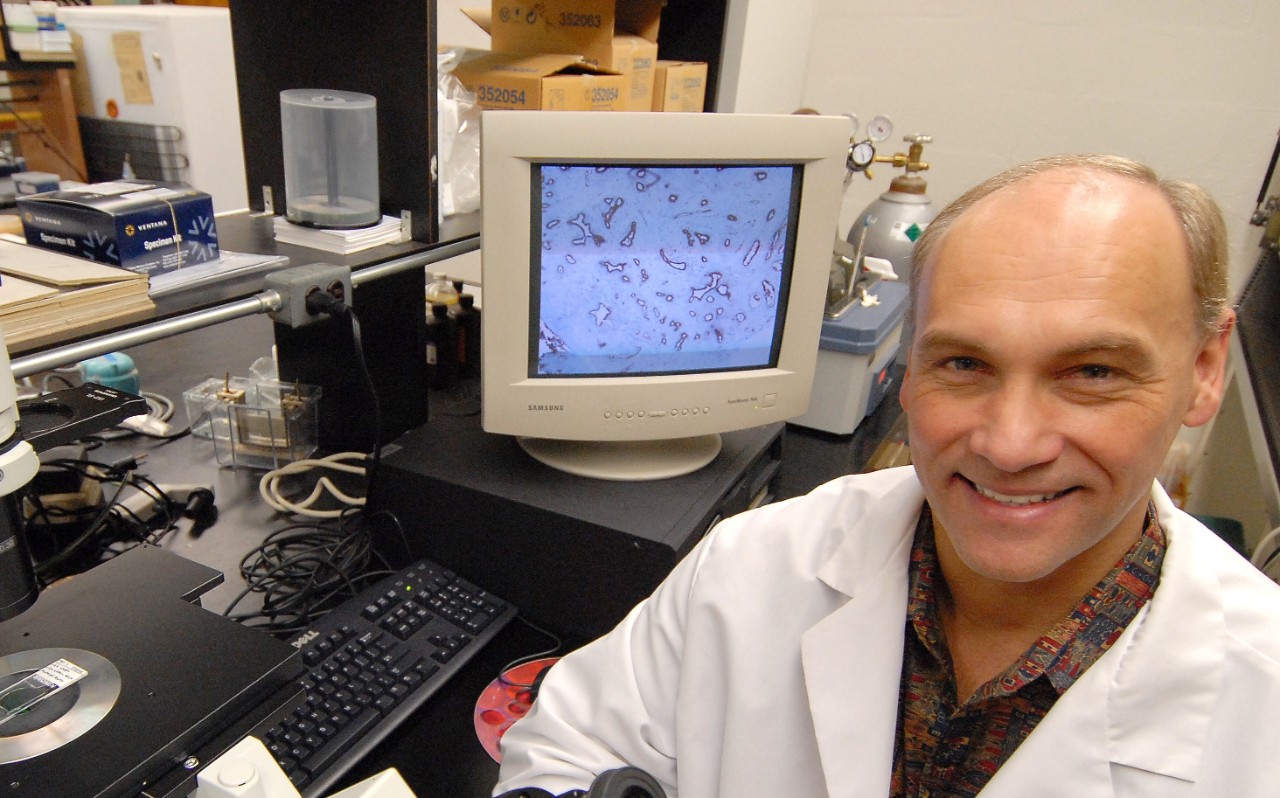
UC developing test for hi/low risk in breast lesions
Currently, with a pre-malignant breast cancer diagnosis from a biopsy, there are three options: observation, chemoprevention or surgery, all of which require a patient to make decisions while operating from a place of fear and unknown outcomes. Some patients, for example, with early breast cancer indications, might choose to have mastectomies, rather than live in uncertainty, when the disease state may not have progressed.
That is why researchers at the University of Cincinnati (UC) are investigating a molecular diagnostic test to determine whether, after biopsy, someone is at high or low risk for actually developing malignant breast cancer.
“The test aids in the decision whether to treat aggressively or wait,” says cancer researcher and principal investigator Georg Weber, MD, PhD, a professor at UC’s James L. Winkle College of Pharmacy.
The study, “Osteopontin and Premalignant Breast Lesions,” appears in the Oct. 24, 2018 issue of The British Journal of Cancer.
In the study, Weber, co-author Elyse Lower, MD, professor of medicine at the UC College of Medicine, director of the UC Cancer Institute’s Breast Cancer Center and UC Health oncologist, and colleagues at Wroclaw Medical University in Poland, analyzed variants of the biomarker Osteopontin (OPN) in 434 women with premalignant breast lesions.
From the sample, they determined that the presence of Osteopontin variants can very reliably assess the risk group a patient belongs to, thus aiding in the decision on how to proceed. “The value lies in being able to examine invasive potential,” says Weber, adding that prognostic biomarkers inform on the probable disease course while predictive biomarkers provide upfront information regarding how likely a patient is to benefit from a specific treatment, and hence may guide the choice of available therapies.
Weber attended medical school in Würzburg, Germany. He worked at the Dana-Farber Cancer Institute, Harvard Medical School from 1990 through 2000. He has published over 100 scientific reports, including many in the most respected professional journals, plus various monographs, including textbooks on molecular oncology and anti-cancer drugs. He holds eight patents and has additional applications pending. His research has made key contributions to understanding the molecular mechanisms of metastasis.
This research was funded by the Marlene Harris-Ride Cincinnati/Pilot Program. Biostatical support was provided by the University of Cincinnati Center for Clinical and Translational Science and Training (CCTST) with funding from the National Center for Advancing Translational Sciences of the National Institutes of Health (Award # 5UL1TR))1425-03).
The authors cite no conflict of interest.
Related Stories
UC Alumni Association names top alumni award winners
February 12, 2026
The University of Cincinnati Alumni Association has announced this year’s recipients of its highest honors for UC alumni. The 2026 honorees include: Vinod K. Dham, CEAS ’77; Thomas D. Cassady, A&S ’76, Hon ’19; Padma Chebrolu, CECH ’92; Ryan C. Marable, PharmD, Phar ’13. Each year, the UC Alumni Association (UCAA) honors a select few of its more than 360,000 alumni based on their career accomplishments and contributions to the university and community, recognizing them during Alumni Week festivities each spring.
UC’s research surges with $346M in awards
February 12, 2026
The University of Cincinnati reached $346 million in sponsored research awards in fiscal year 2025, up 6.6% increase over the previous year. Additionally, funding for clinical trials at UC climbed, with $88 million in industry-sponsored awards and $33 million in federally sponsored awards.
UC pharmacy alum teaches STEM to students
January 23, 2026
The Dayton Daily News highlighted the journey of University of Cincinnati James L. Winkle College of Pharmacy alumnus Doug Wurtzbacher, who now runs STEM after school programs and camps for students through his business iCode.
